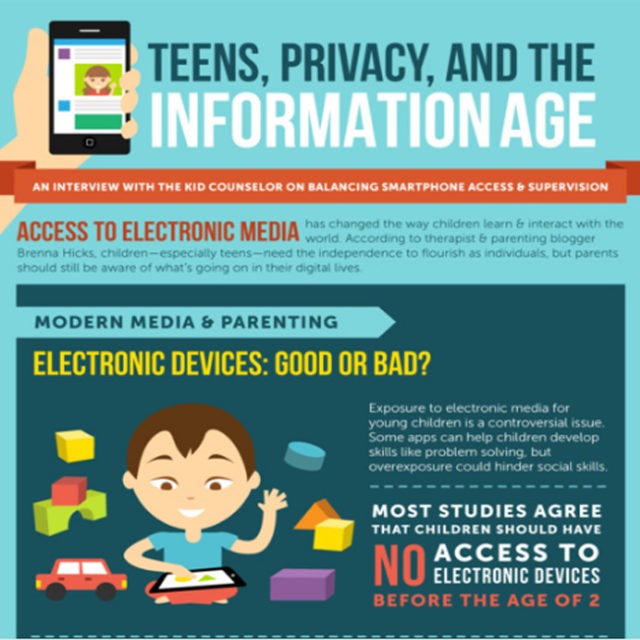Teen Privacy [Infographic]
As a parent of a teen, you understand how “one of those days” can make you feel. The day might have been filled with disagreements regarding clothing choices, miscommunications about homework, grumblings about house rules, and finally culminating in loud screaming tantrums about curfew.
Unfortunately, we’ve all had those days…
You know the ones that leave us feeling that our lives are governed by a teen’s mood swings and hormones. The bombardment of a teen’s unpredictability and poor judgment can lead parents to a crossroad of where to draw personal boundaries about privacy.
Teen Privacy Matters
Privacy is a very important topic for teens. Our sons and daughters are in the process of finding themselves and trying to form a self identity that is separate from their parents. This ultimately is a good thing, but the rite of passage is anything but easy.
This period can be difficult and emotional for children. Simply look back and remember your own adolescent hijinks and trials. Do you remember the awkwardness, stress, and emotions that filled your middle and high school years?
Teenagers today are still dealing with the issues that plagued generations before them. However, we are raising digital natives who document everything with a photo, text, or update on Social Media. This can be a great outlet to connect with peers, but it also leaves them vulnerable to cyberbullying, sexting, online predators, identity theft, and more.
Children often fail to recognize the dangers that cyber world can harbor. Rude comments, racy photos, or rebellious streaks are immortalized online. These posts can affect their adult lives, because employers and college admissions are known to surf Social Media to get a good judgment of character.
A Parent’s Rights
This can lead parents to the world of sleuthing and spying as they desperately try to gain any bits of information about their teen. Sneaking around will ultimately breed mistrust and conflict in the parent/child relationship. However, there are times when it is vital for parents to intervene and closely monitor a child’s Internet usage.
Your teenager might pitch an epic fit, but you do have some rights to monitor a child’s online activity( http://www.teensafe.com/blog/in-the-news/teensafe-news-defense-monitoring-text-messages/)--even if it is on a cell phone. It’s surprising, but parents do have a legal claim to keep tabs on and monitor our children’s phone. They must meet the following two requirements: that the child is under 18 years old and the parents foot the phone bill.
This is welcome news, because many cities and governments are starting to hold parents responsible for their children’s poor social media etiquette like cyberbullying.
(https://www.psychologytoday.com/blog/gender-and-schooling/201410/parents-held-liable-kids-cyberbullying)
4 Tips To Promote Privacy And Communication
Open communication is the best policy to prevent arguments and mistrust. This won’t always be easy when you are dealing with passionate teenagers, but it can be done. Here are four suggestions for parents to encourage positive interactions and monitoring:
Know your child’s Social Media habits. Whether you use an app to keep tabs on Internet and cell phone use or choose to follow them online- remember to be honest and let them know you will be watching. IF they balk at the thought, remind them nothing posted online is truly private and everything has a possibility of being shared.
Look for activities that focus on family time. Plan time together to increase interactions and chances for meaningful discussions. It doesn’t have to be elaborate: simple dinners, walks, or game nights can help bonds form.
Power down all electronics and media occasionally. Unplugging will allow more face-to-face communication and keep distractions at bay.
Listen. Keep conversations going by avoiding lectures and yelling. You might not agree with everything a child says, but it is important to hear his or her views on topics. Relate your personal experiences and offer advice when asked.
Looking Forward To Better Tomorrows
The teenage years might be tough on parents and their offspring, but this stage will pass. These years are forming the children we love into adults. Adults who will one day be thankful their parents took the extra steps to promote communication and judgment skills.
Teens can still have the privilege of privacy, but at times it might be necessary for a parent to take control of a scary situation to provide better tomorrows.
– Amy Williams
A former social worker, specializing in teen behavioral health. As a parent now, with two teenagers of her own, she is focused on spreading the word on positive parenting
techniques and new technologies, particularly the combination of both topics.









